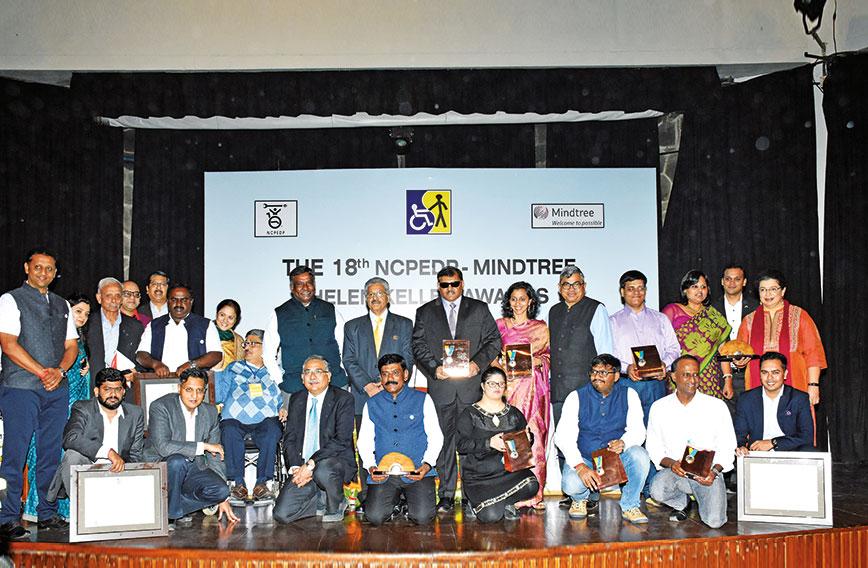
Winners of the Helen Keller-Mindtree Awards
Disability awards mean more than ceremony
Civil Society News, New Delhi
When the Heller Keller Awards were first given out 18 years ago, it wasn’t easy for people with disabilities to find employment. Now, companies rival each other in hiring the disabled and giving them professional roles that people without their challenges would otherwise do.
The Helen Keller Awards have in no small measure contributed to this change. Instituted by the National Centre for Promotion of Employment for the Disabled (NCPEDP), the awards have been a source of inspiration in making workplaces inclusive by ending biases, improving design, using new technologies and recognising the right to employment of disabled people.
The success of the awards comes from the seriousness of purpose with which they have been instituted. Heller Keller was a beacon of hope and courage to people like herself. In recognising companies and individuals who have made a difference, the NCPEDP has provided innumerable living examples of what can be aspired to.
“From 1999 up to now, we have identified 200 role models of individuals and organisations,” says Javed Abidi, who is the CEO of NCPEDP. “We can see a pattern and the progress India has made in employing the disabled.”
“From Wipro to Infosys to ANZ to Pepsi to Lemon Tree and many others — each of them is not a mere awardee but a case study of how the disabled can be given a job on an equal basis with others,” says Abidi.
This year’s awards, supported by Mindtree, the IT company, were given away in Delhi in December.
ROLE MODELS
Devanshi Joshi works as a store assistant in Gram Bharat in RK Puram in New Delhi. Cheerful and efficient, Devanshi helps her juniors and remembers not just product codes and prices but also stock levels and reordering schedules. She delivered the keynote address at the World Down Syndrome Congress in Chennai in August, 2015.
Dr Charudatta Jadhav heads the Accessibility Center of Excellence (CoE) at Tata Consultancy Services. He has helped launch Sugamya Pustakalaya, an online initiative that makes content available nationally to people with visual disability. He is the founder of the enormously successful All India Chess Federation for the Blind.
Dr Nirmita Narasimhan is Senior Fellow and Program Director of G3ict, an IT company in Bengaluru. She is helping to develop and lead its global advocacy programme for the Asia Pacific Region and oversee its ICT Accessibility Advocacy Tools and Resources.
Pradip Sinha is deaf and blind and works as an executive in DELL EMC’S Issue Retrieval Centre in IT Asset Management. Most deaf and blind have an interpreter to help them constantly. Pradip does his work at Dell EMC without such support and lives independently.
PERSONS PROMOTING JOBS
Swaminathan Subramanian works with ANZ’s Bengaluru Service Centre. As Manager, Payment and Operations, he oversees a team of 130-odd people. Swami is leading an initiative to hire persons with disabilities. Over the past seven years, 220 persons with disabilities have been hired in ANZ Bengaluru. This is more than three per cent of its workforce.
SV Krishnan, founder and CEO of Dialogue in the Dark (DID) & ACE Take 1, has helped sensitize over 350,000 people to the abilities of disabled persons resulting in 8,000 job pledges for them from corporate visitors. ACE Take 1 creates at least one job in every company for disabled persons.
COMPANIES PROVIDING JOBS
BarrierBreak Solutions was founded in 2004 by Shilpi Kapoor, who has successfully built a sustainable business in disability products and services. BarrierBreak’s accessibility consulting services include testing websites and mobile applications to make them disabled-friendly. BarrierBreak’s teams comprise people with disabilities. They are the initiators of Techshare India and the recently launched Newz Hook, India’s first channel for disability news.
Hatti Kaapi is a popular South Indian filter coffee chain based out of Bengaluru. More than 10 per cent of Haati Kaapi’s 300 employees are disabled persons. Hatti Kaapi also employs rural youth and senior citizens. It contacts NGOs to find people with autism, physical disability, visual disability and deafness. The coffee chain has decided that one of its outlets will be managed entirely by disabled persons.
Lemon Tree Hotels
India’s largest hotel chain in the mid-priced hotel sector. In 2007, the hotel chain hired two disabled employees. It now employs 662 people with disability and they make up 22 percent of the workforce.
Vindhya E-Infomedia
A BPO that employs close to 1,500 people. Around 58 percent of their employees in their Bengaluru centre are persons with disabilities and their Hyderabad centre is staffed 100 percent by disabled people. They also employ rural youth whose primary occupation was farming. The job helps them become debt free. An important change is that families of those employed now accept that disability is not a liability.
Comments
Currently there are no Comments. Be first to write a comment!



